Talk About Family in French – A Guide to French Family Vocabulary [with Audio]
If you’re learning French, you should learn how to talk about family in French. That’s because family is an important topic that often comes up in conversations. In this article, I’ll share the words you need to know, with audio recordings from myself, a native French speaker.
Allons-y! Let’s get started.
Table of contents
- French Words to Talk About Your Family
- How to Say “Family” in French: Famille
- The Different Types of Family in French
- French Terms of Endearment for Family Members
- How to Write About Your Family in French – Some More Vocabulary
- French Cinema and Family – A Few Recommendations
- You’re All Set to Talk About Your Family in French!
Psst… Do you like French cinema? Stick around until the end of the article for French movie recommendations that revolve around family!
Before we get started, if you’re looking for an online Italian course, here’s the course I recommend: Italian Uncovered - Learn Italian Through the Power of Story, a course with a fascinating new method by my friend Olly. You can try it for free for 7 days!
French Words to Talk About Your Family
“Family” in French is .
To say “family member” in French you would say . You can also say , which also translates to “parent”, as in father or mother.
If you want to talk about family in French, you will need to know the appropriate words to describe the different liens de famille (“family relationships”).
Immediate family:
- or – “the wife”
- or – “the husband”
- – “the parents”
- – “the mother”
- – “the father”
- – “the children”
- – “the daughter”
- – “the son”
- – “the sister”
- – “the brother”
Extended family:
- – “the aunt”
- – “the uncle”
- – “the niece”
- – “the nephew”
- – “the cousin” (feminine)
- – “the cousin” (masculine)
- – “the grand-daughter”
- – “the grandson”
- – “the grandmother”
- – “the grandfather”
- – “the great-granddaughter”
- – “the great-grandson”
- – “the great-grandmother”
- – “the great-grandfather”
All of these form (“close relations”).
Since this is a lot of information, you can download this chart to keep it for further studies:
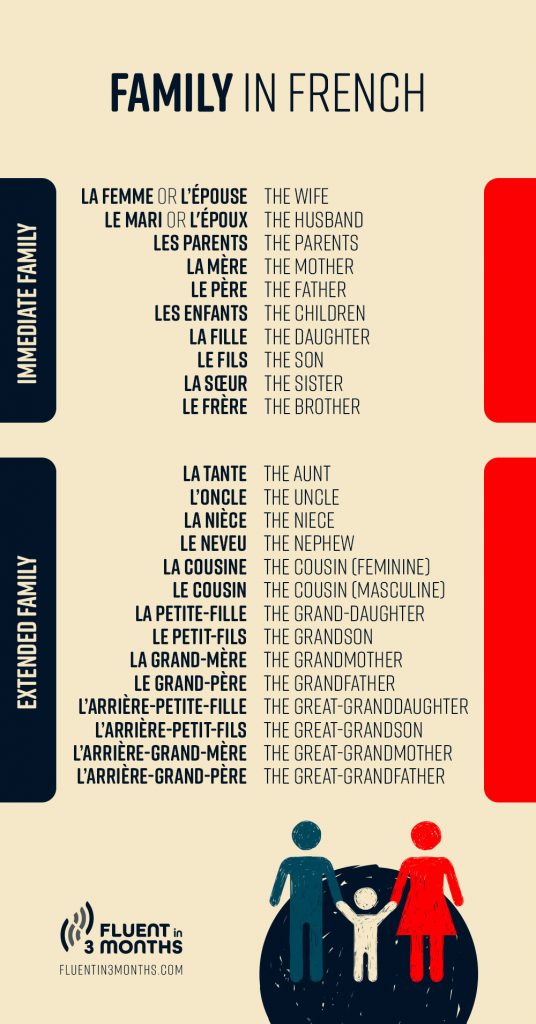
Step-family:
- – “the stepmother”
- – “the stepfather”
- – “the stepsister” or “the half-sister”
- – “the stepbrother” or “the half-brother”
- – “the stepdaughter”
- – “the stepson”
In-laws:
- la belle-mère – “the mother-in-law”
- le beau-père – “the father-in-law”
- – “the sister-in-law”
- – “the brother-in-law
- la belle-fille – “the daughter-in-law”
- le beau-fils – “the son-in-law”
It might also be useful for you to learn the members of the “godparent family”:
- – “the godparents”
- – “the godmother”
- – “the godfather”
- – “the goddaughter”
- – “the godson”
How to Say “Family” in French: Famille
As I mentioned above, “Family” in French is .
Famille is a noun, so you will often see famille coming after an article or a pronoun.
The most common ones are:
- La famille – “(the) family”
- Une famille – “a family”
- Ma famille – “my family”
Let’s pause for a second and take a look at how similar famille is to “family”. These words are cognates: even though they’re from different languages, their spelling and pronunciation are similar, and they have the same meaning.
Cognates help you start learning a new language by giving you an instant vocabulary base. One of our favorite courses at Fi3M, French Uncovered, teaches you to recognise French cognates from the very start of yourjourney learning French. It’s a great way to feel more confident in your knowledge and less intimidated by your target language.
(Remember, at Fi3M we’re all about simple language hacks like this that help you learn a language faster 😉.)
The Different Types of Family in French
Once you’ve mastered how to say famille, you can go a little more in-depth and learn the different types of family categorization in French:
- or – “immediate family”
- – “single-parent family”
- – “stepfamily” or “reconstituted family”
- or – “extended family”
- – “in-laws”
- – “adoptive family” or “foster family”
Rules of Gender, Number Agreement, and the French Family Member Collectives
French follows rules of gender and number agreement. This means that if a noun is feminine, the article and adjective(s) that describe it will also be feminine. The same goes for when a noun is singular or plural. This is important to know if you want to describe your family members, for example.
Let’s look at how the agreement rules work.
While we’re looking at the plural forms of French family members, let’s talk about the collective terms for family members. These are words like “the parents” or “the siblings”, which describe the whole group of family members with the same titles, regardless of their gender.
Here are the most common:
- les parents – “the parents”
- all other terms with parents in them, such as les grandparents
- les enfants – “the children”
- all other terms with enfants in them, such as les petits-enfants
- les cousins – “the cousins”
For the other collective terms, you would mention the plural of both the masculine and femenine members. Here are some examples:
- les frères et sœurs – “the siblings”
- les oncles et tantes – “the uncles and aunts”
When you’re referring to several members of the same gender, for examples “the sisters”, you would use the plural of the term, so les sœurs.
French Terms of Endearment for Family Members
When I’m speaking French with my parents, I don’t call my them * mère (“mother”) and
père (father).
For parents, the most common terms used in French are:
- – “the mom”
- – “the dad”
There isn’t a collective term for parents other than parents in French, you would simply say maman et papa (“Mom and Dad”).
Grandparents too have their own terms of endearment:
- – “the granma”
- (sometimes also spelt papy) – “the grandpa”
You might also hear (“grannie”) and (“granda”), although they are more old fashioned words. My grandmother has never wanted her grandchildren to call her mémé; she says it makes her sound too old!
For siblings, adding petit(e) or grand(e) does the work:
- petite sœur – “little sister”
- petit frère – “little brother”
- grande sœur – “big sister”
- grand frère – “big brother”
When it comes to the rest of the family, oncle has a more tender version: (“uncle”). In some places, tante also has a sweeter version in . In Guadeloupe, where I grew up, children use tatie as an affectionate term for women, even if they aren’t their aunts.
How to Write About Your Family in French – Some More Vocabulary
You’ve learnt the basics of French family vocabulary. Now are you ready for some more specific phrases?
Here are a few phrases you might want to know to talk or write about your family:
- J’ai une grande famille – “I have a big family.”
- J’aime ma famille – “I love my family.”
- La famille d’abord – “family comes first”
- La famille pour toujours – “family forever”
Depending on how deep you get into conversation about your family tree, you might want to know how to say just that. In French, “family tree” is arbre généalogique, which literally translates to “genealogical tree”.
French Cinema and Family – A Few Recommendations
French cinema likes to focus on family. Extended families, reconstituted families, adoptive families… All of them can be the foundation of great French comedy!
As promised at the beginning of the article, here are some of the most popular French films about family.
1. Qu’est-ce qu’on a fait au Bon Dieu ?
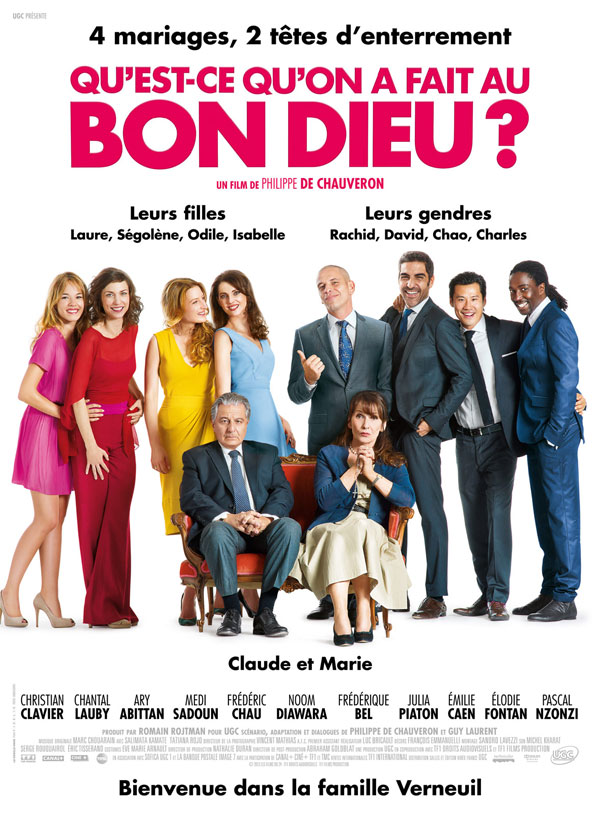
Qu’est-ce qu’on a fait au Bon Dieu ?, or “Serial (Bad) Weddings” in English, is a comedy that features an extended family.
Claude and Marie, a Catholic bourgeois couple from a small village in the north of France, see their conservative views challenged by the marriages of their daughters. The three eldest have married men of different ethnic origins and religious beliefs, so their hopes for a Catholic son-in-law rest with their youngest.
This movie and its sequel, which both star some famous French comedians, is a window into complex French modern culture.
2. C’est quoi cette famille?!
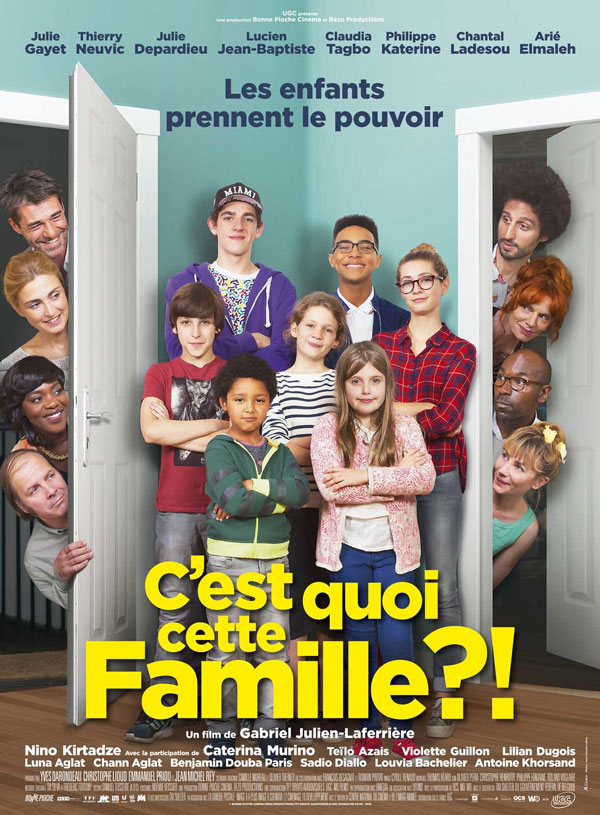
C’est quoi cette famille?!, or “We Are Family” in English, focuses on a reconstituted family.
After several marriages and divorces of both his parents, thirteen-year-old Bastien finds himself part of a very big reconstituted family. Tired of being moved from house to house for shared parenting, the many “half-siblings” decide to live together and have their parents move houses instead.
Even though this movie exaggerates for the sake of comedy, it taps into the reality of reconstituted families, which are very common in France.
3. Il a déjà tes yeux
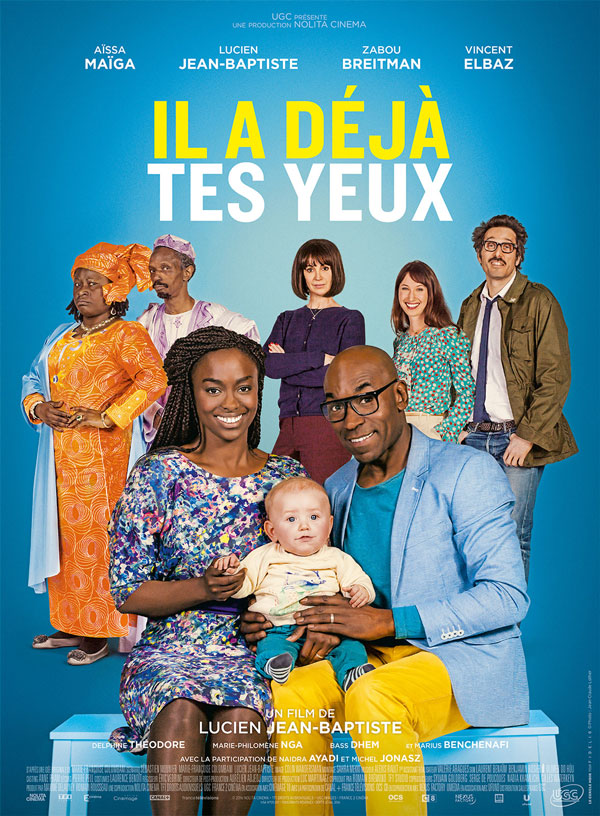
Il a déjà tes yeux, “He Even Has Your Eyes” in English, is the story of a black couple who can’t have biological children and decide to adopt a baby. The baby is four-months-old, and white. Several people around the couple refuse to accept the adoption.
There is also a mini series whose events take place after the movie.
You’re All Set to Talk About Your Family in French!
You can now shop at the père et fils business and listen to your B&B host’s story, and understand everything! Well, at least the part about the family.
If you’re looking for more vocabulary to learn, you could start by checking out this guide to 27 French colors (with audio).
If you’re ready for something else, try working on grammar! French pronouns are a good starting point.
Or maybe try some of these articles:

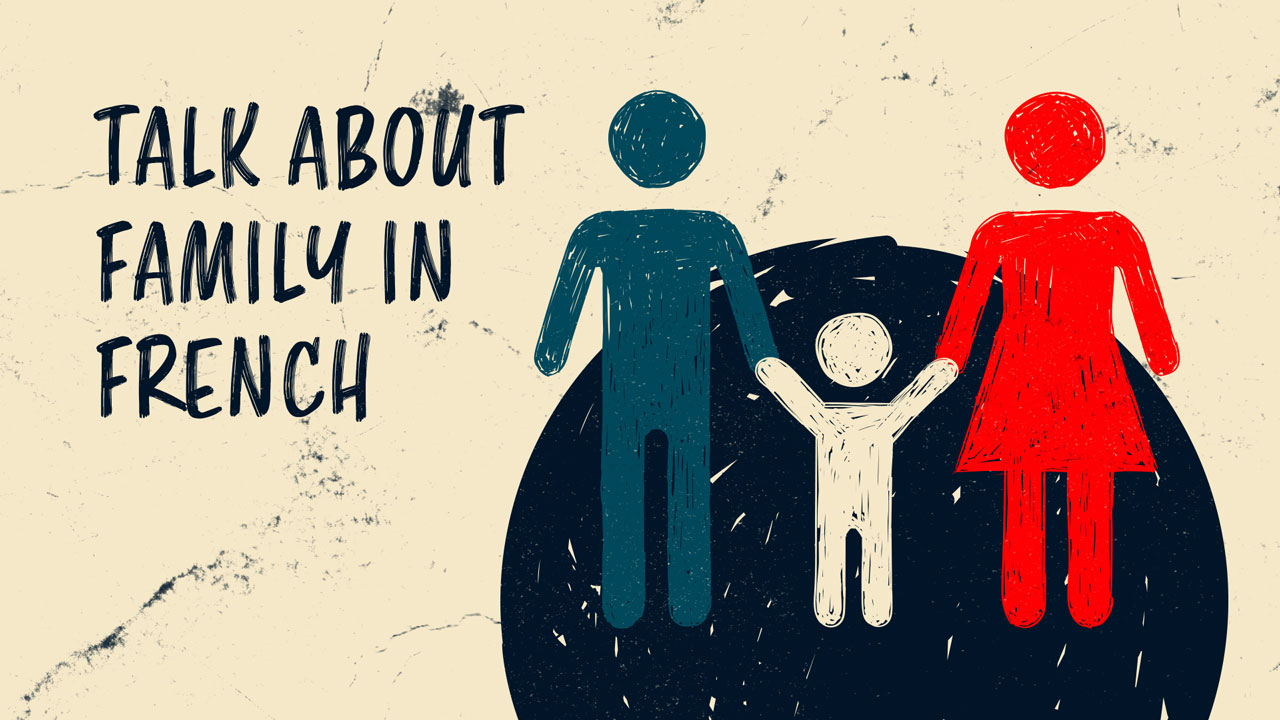

Social